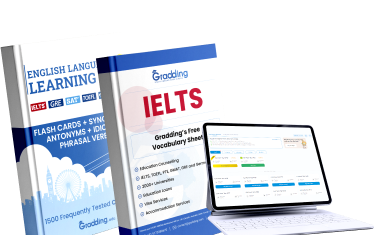In the IELTS speaking section, linking words or linkers holds great importance in making connections between your sentences. However, in reality, the IELTS examiner wants you to use a wide range of vocabulary, various structures of grammar and relevant connectors in the speaking exam. Thus, this blog covers the most used linking words for IELTS speaking along with its types and tips to use them efficiently. So let’s get started and first understand what linking words mean.

Table of Contents
Linking words for IELTS speaking is majorly used for connecting two phrases, sentences, or ideas. They are also called cohesive or connecting devices. These words play a vital role in enhancing overall IELTS speaking vocabulary for parts 1,2 and 3. However, many linking words can be used in both speaking and writing, some should only be used in writing, and others should only be used in speaking. In addition, many of the students fail to understand connectors for IELTS speaking section and lose marks. Thus, in the next section, you will get to know about the different types of IELTS speaking linking words.
Also Read: IELTS Linking Words for Writing Task 1 & 2
To help the examiner, you need to follow your ideas and concepts while appearing for the speaking section. Thus, you will need some linkers for IELTS speaking that are spoken naturally. These linkers will help you enhance your score for fluency and coherence, which counts for 25% of your marks. Further, to ensure the proper usage of these words, below is the list of linking words for IELTS speaking as follows:
Giving additional information
Time Phrases
Expressing Ideas
Causes and Solutions
Giving Examples
Being Clear
Concessions and Contracts
Stating an opinion
Overall, these are the types of linking words for IELTS speaking that can be used in parts 1,2 and 3. In our next section, you will find examples of how to use the linkers in the sentences.
Must Read: Vocabulary for IELTS Speaking
In the above section, we looked at the linking words for the IELTS speaking section. However, in this section, you will learn how to use the speaking connectors with the help of questions and answers. Through the proper use of these words, you will improve your IELTS speaking phrases and sentences. Now look below at the given examples for a proper understanding.
Q: Does she always reach the office on time?
A: Yes, she always reaches the office on time. Furthermore, her work is also established.
Q: What should we do now?
A: At the moment, we will watch an interesting movie and go out for a walk.
Q: Do you think fast food is bad?
A: Yes, I do. It can cause problems such as heart disease or diabetes. Also, it can lead to weight problems that are common nowadays.
Q: Why do people celebrate religious festivals at home?
A: The main reason is to invite friends, and relatives and capture some memorable moments.
Q: How does one can achieve their goals?
A: I think one important thing is patience when it comes to achieving your goals.
Q: Do children play similar games today that they played in the past?
A: No, I don’t think they do. Before, children used to play games like hide and seek and with some handmade toys. But, these days, children tend to prefer to play computer games and their toys are battery-operated.
Q: What is the difference between weather and climate?
I suppose the main difference between weather and climate is a measure of time. Weather is for the short-term of a particular location, while Climate refers to the conditions for a longer period of time.
Q: Are you coming with me to eat lunch?
A: I want to, but on the other hand I have to study too.
These are some of the examples of how you can use IELTS speaking connectors in the exam. In the next section, you will see some useful tips on how to use linking words effectively.
The following section has mentioned the IELTS speaking tips for linking words on how to use them effectively. Through these tricks, you will achieve a high band score.
To sum up, we discussed the linking words for IELTS speaking, along with their types and examples. Further, we had a look at the useful tips on how to use linking words in the speaking section of IELTS. However, this blog has helped you to understand the importance of linkers in IELTS speaking for high band scores. Further, if you are willing to know more about the speaking section, then take our free IELTS speaking mock test and check your score on the spot. Also, you can join our offline or online IELTS classes at an affordable price.
Linking words for IELTS speaking is used for connecting two phrases, sentences, or ideas. They are also called cohesive and connecting devices.
Here are the most common 20 linking words for IELTS speaking.
And, again, and then, besides, equally important, finally, further, furthermore, nor, too, next, lastly, what's more, moreover, in addition, first (second, etc.)
Above all, indeed, truly, of course, certainly, surely, in fact, really, in truth, again, besides, also, furthermore, in addition.

We are available in :
BangaloreAhmedabadJaipurHyderabadKeralaPuneChandigarhMumbaiGurgaonChennaiKolkataTrivandrumNoidaKochiCalicutKottayamKollamThrissurIndoreUdaipurdisclaimer:logos and other registered trademarks of universities used on this platform are held by their respective owners. Gradding does not claim ownership or association on them, and their use is purely for informational and illustrative purposes.

